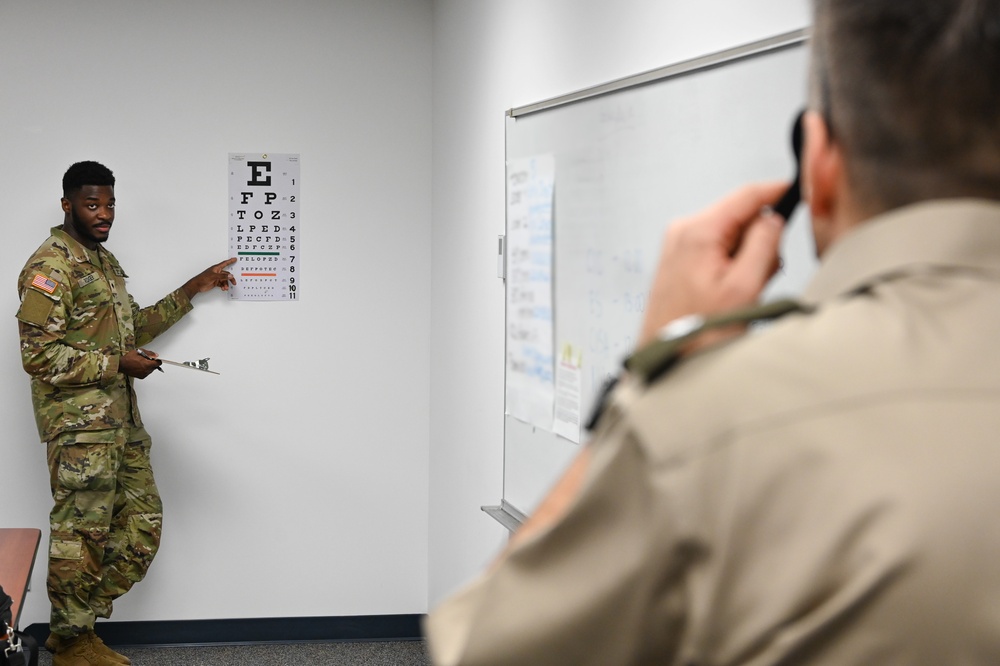National Defense University at Fort Lesley J. McNair hosted a health readiness rodeo on Aug. 4, 2025, welcoming new students as well all service members from across the joint task force–National Capital Region. Rodeos serve as a one-stop shop for staying medically current on exams, immunizations, labs, and profiles, ensuring warfighters can deploy at a moment’s notice.
By 10 a.m., areas of Marshall Hall operated as an efficient flow system, guiding service members from intake to care stations—starting at the registrar for check-in. U.S. Army Capt. Latasha Henderson, clinical nurse officer in charge at Fort McNair Army Health Clinic and detachment officer in charge at Andrew Rader Army Health Clinic, explained, “If they’re not enrolled or don’t have access to (MHS) GENESIS, our representative gets them registered into the electronic health record.” MHS GENESIS is the secure website for 24/7 access to health information, including managing appointments and exchanging messages with your healthcare team.
Comprehensive, efficient care to stay ready
After check-in, service members moved to a station where a record reviewer thoroughly assessed their charts to identify needs for preventive care, such as mammograms, colon cancer screenings, mental health support, or medication refills. Reviewers flagged any issues and referred them to a healthcare provider in the next stage of the rodeo. Providers then addressed those needs on the same day, either by delivering care on site or scheduling future appointments.
U.S. Army Staff Sgt. Tahsin Chowdhury, primary care noncommissioned officer in charge at McNair Army Health Clinic, stressed the importance of service members staying up to date on medical checkups and records. “Let’s say we’re downrange, deployed in theater, and there are dental problems. Now, we have to pull that soldier out of the fight, fly them out of theater to get the care they need, and then fly them back in.”
Readiness rodeos also function as a training ground for medics. “Rodeos give health care personnel the opportunity to maintain and sharpen their clinical and administrative skills,” Henderson said. “They practice mass-readiness operations, which mirror real-world scenarios—making them better prepared for large-scale missions or deployments.”
U.S. Army Spc. Max Cross, a medic Kimbrough Ambulatory Care Center in Fort Meade, Maryland, supported the event to keep service members “ready and rapidly deployable at all times,” he said. “It’s our job to make sure they have all vaccines up to date.”
“We’re making sure everybody has proper eyewear, that their hearing is good, and that everyone is 100% ready for whatever they’re going to tackle the next day. The medic is there for emotional help, physical help—they’re the jack of all trades,” he added.
Foundation of trust, regardless of rank
Aside from providing these vital health assessments and follow-up care, the rodeo also cultivated an element of trust between patient and provider.
“Warfighters need to trust that medics will keep them healthy, treat injuries quickly and manage conditions effectively,” Henderson said. “This trust allows them to focus on the mission, knowing their medical team has their back when it matters most.”
Medical staff worked at various provider stations to assist service members progressing through the rodeo. In one room, several sat wearing wireless headphones connected to a tablet that conducted hearing tests out of the traditional sound booth. In another, service members received immunizations and lab tests and assessed their vision against a letter chart while a medic clicked the diagnostic lenses into focus.
Those attending the rodeo included lieutenant colonels and above. “These are all senior leaders that are getting ready to take command. They come to the university for only a year, so we try to take care of all their medical readiness on the front end, since their schedules are so busy,” Henderson said.
U.S. Army Sgt.1st Class Marisela Laracuente, the noncommissioned officer in charge of the readiness rodeo, said medics treating leaders is mutually beneficial.
“For the medics it gives them more confidence working with senior officers, and it also helps leaders coming through the rodeos to trust in their medics,” she said. “Since we will be their first line of care downrange, it goes both ways and builds confidence on both sides.”
Screening to stay healthy and ready
While many came seeking care for known issues, the event also uncovered health needs through screenings. Record reviewers flagged abnormal test findings during the rodeo and sent results to providers down the line. Chowdhury described why these preventive screenings are vital to staying fit for the fight: “Maybe they’re over 45 and they needed to get a colonoscopy but forgot to schedule one. This would become apparent during the periodic health assessment. That’s why we hammer in readiness.”
At the core of the health readiness rodeo, Chowdhury said, is for all to stay ready for the mission. “We hold events like this so we can carry on with the mission—winning America’s wars.”
Date Taken:
08.20.2025
Date Posted:
08.20.2025 15:13
Story ID:
546071
Location:
US
Web Views:
12
Downloads:
1
PUBLIC DOMAIN

This work, Fort Lesley J. McNair holds health readiness rodeo, streamlines care to ‘carry on the mission’, by Andrew Ortuzar, identified by DVIDS, must comply with the restrictions shown on https://www.dvidshub.net/about/copyright.
